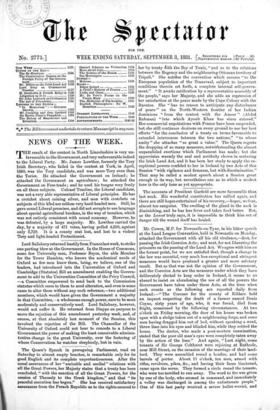The Queen's Speech in proroguing Parliament, read on Saturday to
almost empty benches, is remarkable only for its good English and its complete unpretentiousness. After the usual assurances of her "amicable and cordial" relations with all the Great Powers, her Majesty states that a treaty has been concluded, "with the sanction of all the Great Powers, for the cession of Thessaly to the Greek kingdom," and that "its peaceful execution has begun." She has received satisfactory assurances from the French Republic as to the rights secured to her by treaty With the Bey of Tunis, "and as to the relations between the Regency and the neighbouring Ottoman territory of Tripoli." She notifies the convention which secures "to the European population of the Transvaal, subject to important conditions therein set forth, a complete internal self-govern- ment." "It awaits ratification by a representative assembly of the people," says her Majesty, and she adds an expression of her satisfaction at the peace made by the Cape Colony with the Basutos. She "has no reason to anticipate any disturbance of peace" on the North-Western frontier of her Indian dominions "from the contest with the Ameer " (Abdul Rahman) "into which Ayoub Khan has since entered." Her commercial negotiations with France have been suspended, but she still continues desirous on every ground to use her best efforts "for the conclusion of a treaty on terms favourable to extended intercourse between the two nations," "to whose amity" she attaches "so great a value." The Queen regrets the dropping of so many measures, notwithstanding the almost unparalleled exertions which Parliament has made ; but she appreciates warmly the zeal and assiduity shown in maturing the Irish Land Act, and it has been her study to apply the ex- ceptional powers confided to her in Ireland by two Acts of this Session "with vigilance and firmness, but with discrimination." That may be called a modest speech about a Session great enough in its way, but nevertheless one as to which a modest tone is the only tone as yet appropriate.


































